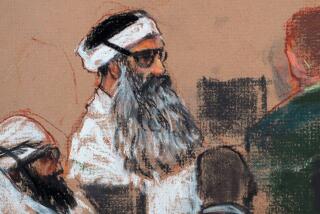Deal reached to allow Khalid Shaikh Mohammed to testify
WASHINGTON — Lawyers in the upcoming trial of an alleged top Al Qaeda leader reached a compromise Thursday to allow his defense attorney to submit written questions to Khalid Shaikh Mohammed, with government lawyers allowed to review the questions and answers from the presumed Sept. 11 mastermind to ensure no classified material is included.
If government national security officials clear those replies, that could lead to highly dramatic testimony from Mohammed during the New York trial of Sulaiman abu Ghaith, possibly through a closed-circuit feed or videotape from Guantanamo Bay.
The complex turn of events came after Mohammed agreed to help the legal defense of Abu Ghaith, who is charged with criminal conspiracy in connection with the Sept. 11 terrorist attacks. Mohammed faces a U.S. military trial at the prison compound in Cuba, charged with capital murder on suspicion of plotting the attacks.
Abu Ghaith’s chief defense lawyer, Stanley Cohen, reached out to Mohammed last month for help. The former top advisor to Osama bin Laden has submitted written statements on behalf of other Al Qaeda operatives in their criminal trials, and his words helped downplay their roles.
Cohen now must get the responses from Mohammed, review them and decide whether Mohammed should be the star witness — all before the Abu Ghaith trial begins with jury selection on Feb. 24.
“We are going to work as quickly as is humanly possible,” Cohen said in an interview after the two sides met with U.S. District Judge Lewis A. Kaplan. “But I don’t know how this can be done in a few days. There’s a lot to get it done, and we are drafting our questions right now.”
Mohammed was captured in 2003 in Pakistan. After being harshly interrogated, he was sent to Guantanamo Bay in 2007. Along with four other Al Qaeda operatives, he faces a military trial there that could lead to his execution.
Twice in the past, his written statements were used in other terrorism trials. One defendant escaped the death penalty. The other was released from Guantanamo Bay.
Last March, the government announced it had arrested Abu Ghaith after he sneaked from Afghanistan into Iran. Described as Bin Laden’s top propagandist, he is accused of warning that more plane attacks were coming after the assault on the World Trade Center and the Pentagon.
Abu Ghaith is not charged with the Sept. 11 attacks. Rather, he faces life in prison for speaking on behalf of the terrorist organization.
In January, Cohen asked Mohammed’s chief civilian attorney, David Nevin, if Mohammed would cooperate in Abu Ghaith’s defense and grant a pretrial interview.
Nevin wrote back on Jan. 27, saying Mohammed would help. But Mohammed also set conditions. A primary demand was that the interview take place “in the absence of government personnel whether physically present or by listening or recording remotely.”
It was unclear Thursday whether Mohammed would be willing to allow the government to review the questions and answers. Cohen said he had not yet heard back from Nevin on the arrangement.
But if Mohammed gives the go-ahead and any of his responses are cleared through intelligence censors, Cohen said he would decide whether to bring Mohammed in some fashion before the New York jury.
“If I conclude that any of his responses are relevant to our defense,” Cohen said, “then I will make a motion to depose him and use him at trial.”
The Abu Ghaith case probably will be the only time that a Sept. 11-related trial will be held in New York, the scene of the worst devastation after two planes flew into the World Trade Center towers.
The Justice Department had attempted to try Mohammed in the same federal courthouse. But that proposal drew an outcry from victims, politicians and other city leaders, forcing prosecutors to relinquish his case to a military tribunal.
More to Read
Sign up for Essential California
The most important California stories and recommendations in your inbox every morning.
You may occasionally receive promotional content from the Los Angeles Times.











